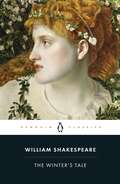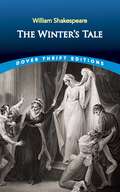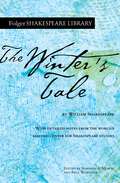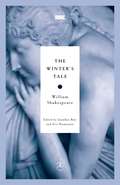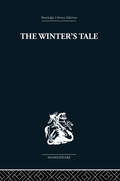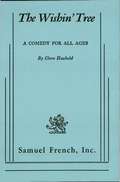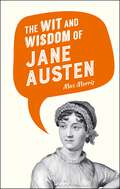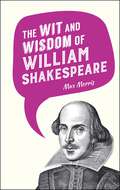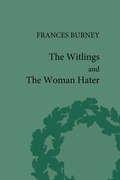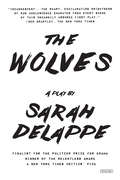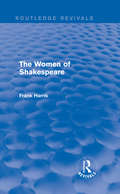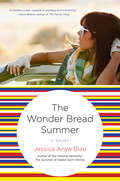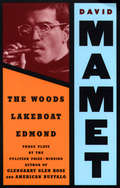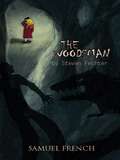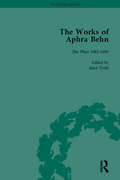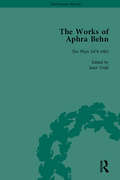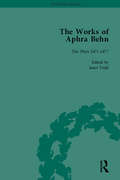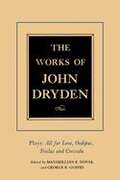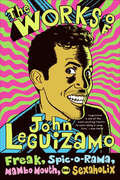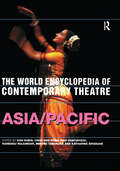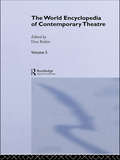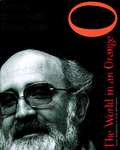- Table View
- List View
The Winter's Tale
by William Shakespeare'The work of Shakespeare is virtually infinite' Jorge Luis BorgesA jealous king, convinced that his wife has been unfaithful and is having another man's baby, imprisons her and puts her on trial. The child is abandoned to die, but when she is found and raised by a shepherd, it seems redemption may be possible. A bravura blend of tragedy, comedy and romance, Shakespeare's emotionally potent late play explores artifice and nature, mortality and renewal, and the destructive and consoling effects of time.Used and Recommended by the National TheatreGeneral Editor Stanley Wells Edited by Ernest Schanzer Introduction by Russ McDonald
The Winter's Tale (Dover Thrift Editions: Plays)
by William ShakespeareRunning an emotional gamut from betrayal and broken hearts to romance and reconciliation, this 1611 tragicomedy begins with the tyrannical actions of a jealous king, whose baseless suspicions destroy his own family. The play's second half takes place 16 years later, when the lively plot takes a lighthearted turn, abounding in song and dance.
The Winter's Tale (Folger Shakespeare Library)
by William ShakespeareThe authoritative edition of The Winter&’s Tale from The Folger Shakespeare Library, the trusted and widely used Shakespeare series for students and general readers.The Winter&’s Tale, one of Shakespeare&’s very late plays, is filled with improbabilities. Before the conclusion, one character comments that what we are about to see, &“Were it but told you, should be hooted at / Like an old tale.&” It includes murderous passions, man-eating bears, princes and princesses in disguise, death by drowning and by grief, oracles, betrayal, and unexpected joy. Yet the play, which draws much of its power from Greek myth, is grounded in the everyday. A &“winter&’s tale&” is one told or read on a long winter&’s night. Paradoxically, this winter&’s tale is ideally seen rather than read—though the imagination can transform words into vivid action. Its shift from tragedy to comedy, disguises, and startling exits and transformations seem addressed to theater audiences. This edition includes: -Freshly edited text based on the best early printed version of the play -Full explanatory notes conveniently placed on pages facing the text of the play -Scene-by-scene plot summaries -A key to the play&’s famous lines and phrases -An introduction to reading Shakespeare&’s language -An essay by a leading Shakespeare scholar providing a modern perspective on the play -Fresh images from the Folger Shakespeare Library&’s vast holdings of rare books -An annotated guide to further reading Essay by Stephen Orgel The Folger Shakespeare Library in Washington, DC, is home to the world&’s largest collection of Shakespeare&’s printed works, and a magnet for Shakespeare scholars from around the globe. In addition to exhibitions open to the public throughout the year, the Folger offers a full calendar of performances and programs. For more information, visit Folger.edu.
The Winter's Tale (Modern Library Classics)
by William Shakespeare Jonathan Bate Eric RasmussenOne of the last plays Shakespeare penned on his own, The Winter's Tale is a transcendent work of death and rebirth, exploring irrational sexual jealousy, the redemptive world of nature, and the magical power of art.Under the editorial supervision of Jonathan Bate and Eric Rasmussen, two of today's most accomplished Shakespearean scholars, this Modern Library series incorporates definitive texts and authoritative notes from William Shakespeare: Complete Works. Each play includes an Introduction as well as an overview of Shakespeare's theatrical career; commentary on past and current productions based on interviews with leading directors, actors, and designers; scene-by-scene analysis; key facts about the work; a chronology of Shakespeare's life and times; and black-and-white illustrations. Ideal for students, theater professionals, and general readers, these modern and accessible editions from the Royal Shakespeare Company set a new standard in Shakespearean literature for the twenty-first century.From the Trade Paperback edition.
The Winter's Tale (The New Cambridge Shakespeare)
by William Shakespeare edited by Susan Snyder Deborah T. Curren-AquinoThe Winter's Tale is one of Shakespeare's most varied, theatrically self-conscious, and emotionally wide-ranging plays. This 2007 edition provides a newly-edited text, a comprehensive introduction that takes into account current critical thinking, and a detailed commentary on the play's language designed to make it easily accessible to contemporary readers. Much of the play's copiousness inheres in its generic intermingling of tragedy, comedy, romance, pastoral, and the history play. In addition to dates and sources, the introduction attends to iterative patterns, the nature and cause of Leontes' jealousy, the staging and meaning of the bear episode, and the thematic and structural implications of the figure of Time. Special attention is paid to the ending and its tempered happiness. Performance history is integrated throughout the introduction and commentary. Textual analysis, four appendices - including the theatrical practice of doubling, and a select chronology of performance history - and a reading list complete the edition.
The Winter's Tale: A Commentary on the Structure
by Fitzroy PyleFirst published in 1969. Critics have in the past described The Winter's Tale as a work of "haphazard structure". More recent criticism has defended the structure of the play and this work shows that the evidence points to the fact that Shakespeare took infinite pains with the choice and disposition of the materials of The Winter's Tale. The scene-by-scene commentary considers The Winter's Tale in isolation, but prologue, epilogue and appendix place it in the context of related plays, and discuss, among others, the problem of genre as it affects the play.
The Wishin' Tree
by Cleve HauboldComedy / 8f / Interior / Ol' Granny Creep gives Mattie Sparks a tree that can make wishes come true. Mattie and Gramma Twiggins share the surprises as its magic stirs up hilarity. The action is fast and furious, building to a climax that reveals ture worth of the wishin' tree. Featured are clear cut comedy roles, an imaginative plot and sure fire farce situations.
The Wit and Wisdom of Jane Austen
by Max Morris'Wisdom is better than wit, and in the long run will certainly have the laugh on her side.' Letter to Fanny KnightThis entertaining collection gathers together Jane Austen’s wisest and wittiest quotations. The Wit and Wisdom of Jane Austen is a book full of sense and sensibility that’s sure to delight all lovers of this great British writer’s uniquely humorous and perceptive style.
The Wit and Wisdom of William Shakespeare
by Max Morris'There is nothing either good or bad, but thinking makes it so.' HamletThis entertaining collection gathers together William Shakespeare’s wisest and wittiest quotations. The Wit and Wisdom of William Shakespeare proves that brevity is the soul of wit and is sure to delight all lovers of the Bard’s uniquely perceptive and influential works.
The Witlings and the Woman Hater (Pickering Women's Classics)
by Geoffrey M SillThis edition contains two of Frances Burney's comedies: "The Witlings", (1778-80) which satirizes the bluestockings; and "The Woman Hater" (1800-02), which explores social pretension and gender conflict.
The Wolves: A Play: Off-broadway Edition
by Sarah DeLappe“The scary, exhilarating brightness of raw adolescence emanates from every scene of this uncannily assured first play by Sarah DeLappe.” —Ben Brantley, The New York Times One of the most-talked about new plays of the 2016 Off-Broadway season, Sarah DeLappe’s The Wolves opened to enthusiastic acclaim, including two sold-out, extended runs at The Playwrights Realm/The Duke on 42nd Street. The Wolves follows the 9 teenage girls—members of an indoor soccer team—as they warm up, engage in banter and one-upmanship, and fight battles big and small with each other and themselves. As the teammates warm up in sync, a symphony of overlapping dialogue spills out their concerns, including menstruation (pads or tampons?), is Coach hung over?, eating disorders, sexual pressure, the new girl, and the Khmer Rouge (what it is, how to pronounce it, and do they need to know about it—“We don’t do genocides ’til senior year.”) By season’s and play’s end, amidst the wins and losses, rivalries and tragedies, they are warriors tested and ready—they are The Wolves.
The Women of Shakespeare (Routledge Revivals)
by Frank HarrisFrank Harris argues that the way women are presented in Shakespeare’s plays and sonnets are a reflection of the real-life women in his life, namely his wife, mother, mistress and daughter. Originally published in 1911, The Women of Shakespeare also analyses the traditional criticism of the time and places his own views in this context. This title will be of interest to students of English Literature.
The Wonder Bread Summer: A Novel
by Jessica Anya Blau“Picaresque, properly funny, unpredictable and altogether irrepressible.” —Nick Hornby, The BelieverJessica Anya Blau, author of The Summer of Naked Swim Parties and Mary Jane, delivers a darkly hilarious, heartbreaking coming-of-age novel with The Wonder Bread Summer.In The Wonder Bread Summer, loosely based on Alice in Wonderland, 20-year-old Allie Dodgson has adventures that rival those Alice had down the rabbit hole. Or those of Weeds’ Nancy Botwin.Allison is working at a dress shop to help pay for college. The dress shop turns out to be a front for drug dealers. And Allison ends up on the run—with a Wonder Bread bag full of cocaine.With a hit man after her, Allison wants the help of her parents. But there’s a problem: Her mom took off when Allison was eight; her dad moves so often Allison that doesn’t even have his phone number….Set in 1980s California, The Wonder Bread Summer is a wickedly funny and fresh caper that’s sure to please fans of Christopher Moore, Carl Hiaasen, and Marcy Dermansky.
The Woods, Lakeboat, Edmond: Three Plays
by David MametThree plays from the Pulitzer Prize and Tony Award–winning author of Glengarry Glen Ross and American Buffalo. The Woods is a modern dramatic parable about, as Mamet put it, &“why men and women have a hard time trying to get along with each other.&” The story features a young man and woman spending a night in his family&’s cabin where they experience passion, then disillusionment, but are in the end reconciled by mutual need. In Lakeboat, an Ivy League college student takes a summer job as a cook aboard a Great Lakes cargo ship where the crewmembers—men of all ages—share their wild fantasies about sex, gambling, and violence. Mamet also wrote the screenplay to the 2000 film starring Peter Falk and Denis Leary. In Edmond, a white-collar New York City man is set morally adrift after a visit to a fortune-teller. He soon leaves an unfulfilling marriage to find sex, adventure, companionship, and, ultimately, the meaning of his existence. Mamet also wrote the screenplay for the 2005 film starring William H. Macy. &“[A] beautifully conceived love story.&” —Chicago Daily News on The Woods &“[Mamet&’s] language has never been so precise, pure, and affecting.&” —Richard Eder of The New York Times on The Woods &“Richly overheard talk and loopy, funny construction.&” —Michael Feingold in The Village Voice on Lakeboat &“A riveting theatrical experience that illuminates the heart of darkness.&” —Jack Kroll of Newsweek on Edmond
The Woodsman
by Steven FechterDrama / 4m, 3f / Walter is a quiet man who must lead a quiet life. As a convicted sex offender fresh out of state prison, he sees no choice. He works in a warehouse. He lives alone. He sees a therapist named Rosen. His only visitor is his brother-in-law Carlos. He also gets visits from a demon in the form of a beautiful Girl. Often brooding by his window, Walter watches children as they head for school. One day Nikki, a tough-talking woman from work, drops by. She doesn't waste time making the first move. Next morning Walter confesses his dark past. But Nikki doesn't run away. Things are looking up – until Walter follows a twelve-year-old girl named Robin into a city park. Nothing happens, but Walter is scared. Then police Sgt. Lucas pays Walter a visit applying some rough intimidation. Walter disappears. A panicky Nikki asks Rosen to help her find him. Walter is back at the park, waiting. When Robin arrives Walter is gently seductive. But the seduction is aborted when Robin reveals a shocking secret. Forced to confront his past, Walter finds the compassion to help and not hurt. In doing so, he grabs a chance for redemption. The Woodsman was made into the critically acclaimed 2004 film starring Kevin Bacon. ”The Woodsman is an interesting, valuable and insightful play...” – The Stage
The Works of Aphra Behn: The Plays, 1678-1682 (The Pickering Masters)
by Janet ToddAphra Behn (1640-1689) was one of the most successful dramatists of the Restoration theatre and a popular poet. This is the final volume in a set of seven which comprises a complete edition of all her works.
The Works of Aphra Behn: The Plays, 1678-1682 (The Pickering Masters)
by Janet ToddAphra Behn (1640-1689) was one of the most successful dramatists of the Restoration theatre and a popular poet. This is the sixth volume in a set of seven which comprises a complete edition of all her works.
The Works of Aphra Behn: The Plays, 1678-1682 (The Pickering Masters)
by Janet ToddAphra Behn (1640-1689) was one of the most successful dramatists of the Restoration theatre and a popular poet. This is the fifth volume in a set of seven which comprises a complete edition of all her works.
The Works of John Dryden: All for Love, Oedipus, Troilus and Cressida, Volume XIII
by John Dryden Maximillian E. NovakVolume XIII contains three of Dryden's Plays, along with accompanying scholarly apparatus: All for Love, Oedipus, and Troilus and Cressida.
The Works of John Dryden: De Arte Graphica and Shorter Works, Volume XX
by John Dryden A. E. Wallace MaurerPresents six pieces written during Dryden's final decade. Two are translations, three introduce translations made by others, and the sixth introduces an original work by one of Dryden's friends.
The Works of John Dryden: Wild Gallant, Rival Ladies, The Indian Queen, Volume VIII
by John Dryden John Harrington Smith Dougald MacmillanVolume VIII contains three of Dryden's Plays, along with accompanying scholarly apparatus: Wild Gallant, Rival Ladies, and Indian Queen.
The Works of John Leguizamo: Freak, Spic-o-rama, Mambo Mouth, and Sexaholix
by John LeguizamoThis volume collects all four of the writer-performer’s legendary, award–winning solo shows.John Leguizamo rose to stardom with a series of critically acclaimed solo shows in which he embodied a diverse cast of unforgettable characters. Now all four of these classic theatrical works—Freak, Spic-o-Rama, Mambo Mouth, and Sexaholix—are available in this one essential volume.Mambo Mouth Leguizamo’s first show was an Off-Broadway sensation. In it, he portrayed seven different Latino characters in a bravura performance that earned him both Obie and Outer Critics Circle awards. Spic–O–Rama A “dysfunctional family comedy,” presents 24–hours in the life of one family. It enjoyed a sold–out run in Chicago before relocating to New York where it won its creator a Drama Desk Award. Freak Leguizamo’s Broadway debut tells his own coming–of–age story. A “demi–semi–quasi–pseudo–autobiography,” which went on to become an Emmy special on HBO. Sexaholix: A Love Story Leguizamo’s “raunchy-yet-sweet comic solo performance”—a hit on both Broadway and HBO—explores his own coming of age as he transforms into a father and family man (Washington Post).
The World Encyclopedia of Contemporary Theatre: Volume 5: Asia/Pacific
by Ravi Chaturvedi Don Rubin Katherine Brisbane Ramendu Majumdar Chua Soo Pong Minoru TanokuraThis new paperback edition provides a unique examination of theatre in Asia and the Pacific and is written by leading experts from within the countries covered. Its far-reaching scope and broad interpretation of theatre (to include all types of performance) set it apart from any other similar publication. Entries on 33 Asian countries are featured in this volume, preceded by introductory essays on Asian Theatre, Theatre in the Pacific, History and Culture, Cosmology, Music, Dance, Theatre for Young Audiences, Mask Theatre and Puppetry.The volume contains approximately 300,000 words and includes national essays of up to 25,000 words each. The countries include:Afghanistan * Australia * Bangladesh * Bhutan * Brunei * Cambodia * India * Indonesia * Iran * Japan * Kazakhstan *Kirghizia * Laos * Malaysia * Myanmar * Mongolia * Nepal *New Zealand * Pakistan * Papua New Guinea * PhilippinesNew Zealand * Pakistan * Papua New Guinea * Philippines *Singapore * South Korea * South Pacific * Sri Lanka * Tadjikistan * Thailand * Turkmenistan * Vietnam
The World Encyclopedia of Contemporary Theatre: Volume 5: Asia/Pacific
by Don RubinThis volume featrues over 250,000 words and more than 125 photographs identifying and defining theatre in more than 30 countries from India to Uzbekistan, from Thailand to New Zealand and featuring extensive documentation on contemporary Chinese, Japanese, Indian and Australian theatre.
The World in an Orange: Creating Theatre with Barney Simon
by Jane Fox Lionel Abrahams Leila Henriques Irene StephanouBarney Simon (1932-1995) was the legendary artistic director, writer, and co-creator ofthe Market Theatre in Johannesburg, one of the most influential and distinguished theatres in South Africa and the world. He workshopped, wrote, and directed unforgettable and pertinent plays in his quest to "hold a mirror up high to society." These works stand as a testament to South Africa's recent history. Here are 80 testaments from international artists about Barney's often mysterious creative process. Barney was especially known for his famous "orange exercise." Through a single orange, he communicated lessons of detail,care, and respect. With full-color illustrations throughout, this is an essential book for students and teachers of theatrical expression, and indeed for anyone who strives to understand their own voice. With the passing of a decade of democracy in South Africa, The World in an Orange is a record of the last years of apartheid and the role of the arts community in bringing it down.
